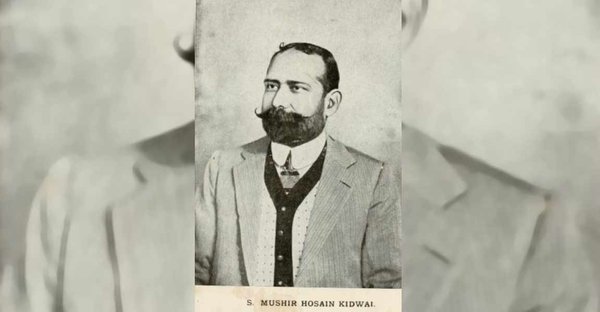Gadia (Barabanki District), UTTAR PRADESH :

Photo Credit: Islam and Socialism, London, 1913.
Shaikh Mushir Husain Kidwai (1878-1937) was a multifaceted personality — an Islamic scholar, writer, lawyer, politician, and freedom fighter. Born on August 17, 1878, in Gadia, District Barabanki (UP), he came from a Zamindar family of Gadia, Awadh (UP).
After completing his education in Lucknow, he went to England where he passed the bar exam. He started his practice at the Allahabad High Court in 1921 and became a consultant to the British Indian Association and also held the post of Senior Judge at the Lucknow Bench.
He was one of the active leaders of the Khilafat and Non-cooperation Movement and was the Joint Secretary of Anjuman-e-Islam London, a branch of the Pan Islamic Society.
In early 1913, he formulated a scheme for the establishment of a society for the protection of the Haramain Sharifain along with Maulana Abdul Bari Firangi Mahli so that these holy places would not be attacked by non-Muslims during the First World War. This scheme was first published in Maulana Abul Kalam Azad’s Al-Hilal on 30 April 1913. In this regard, Maulana Abdul Bari and his colleagues founded the “Anjuman Khuddam-e-Kaaba” on May 6, 1913, with Mushir Husain Kidwai as its Secretary.
He wrote a pamphlet entitled “Future of Muslim State”, which was published by the Central Islamic Society of London in 1921, in which he wrote that Turkish exploitation and disintegration would destroy the Muslim World. He also published a manifesto in London which was widely circulated in support of Turkey.
In March 1920, he also signed a manifesto with Maulana Abdul Bari, Maulana Azad and Maulana Shaukat Ali, which was drawn up in the background of the conspiracy to dismember Turkey.
In May 1920, he presided over the Awadh Khilafat Congress at Faizabad.
Sultan Abdul Hamid II awarded him Order of Osmaniah for his outstanding contribution to Pan-Islamic causes.
He was a member of the All India Muslim League meeting, which was a member of the Commission of Inquiry into the causes and events of the Mopla Rebellion, which was constituted by the Muslim League in December 1921.
In May 1926, he was also a member of a committee formed by the League whose purpose was to draw up a scheme for a constitution for India.
He participated as a distinguished delegate in the Nationalist Muslim Conference at Lucknow on July 20, 1930. He was a member of the Central Legislative Assembly four times (1924, 1930, 1935 and 1936) and was elected unopposed each time.
He was also a prolific political writer, both in English and Urdu, and his articles on Islam, Khilafat, Socialism, and politics of the Subcontinent appeared in several English and Urdu periodicals of that time. He also authored several books on Islam, Khilafat and politics. Some of them are:
- Swaraj and How to obtain it
- Pan-Islamism and Bolshevism
- Islam and Socialism
- Islam and Woman
- Taleem-e Niswan
- Duniya ke teen shohdae Salasa.
He passed away on 27th December 1937.
source: http://www.milligazette.com / The Mili Gazette / Home> News> History / by The Milli Gazette Online / by Dr Asad Faisal Farooqui, Aligarh / November 22nd, 2024








